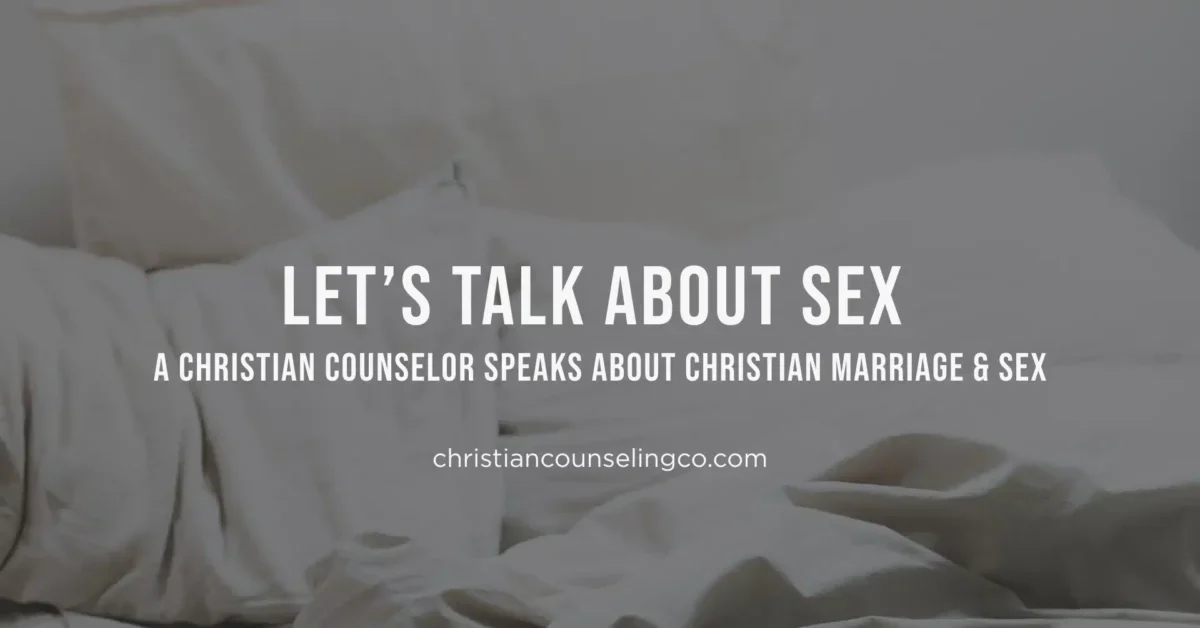Unlocking Consistent Character
*Note: Before you read on, please consider that there may be content here that is triggering if you have experienced trauma related to sex or sexuality. Proceed at your discretion.
In recent discussions here at Cornerstone, we’ve had a shared realization that many people we meet with are finding it challenging to discuss the topic of sex with their spouses, children, and church communities. So, we wanted to bring it into the open and begin some dialogue about it!
We believe that we need to be willing to engage in conversations about sex and sexuality as Christian men and women. As leaders. As parents. And especially as spouses, because we also believe that this is one area of relationship that “the thief’s purpose is to steal, kill, and destroy” (John 10:10).
I grew up in a home with a father and mother who were both in the medical field. This was a home where conversation about sex and anatomy were normalized and co-mingled with discussions about scripture and the activity of God. I now recognize that this was a privilege, and that I am in the minority!
Many people that I know grew up with vastly different circumstances. Many had horrendous experiences that taught them to associate their nakedness and any reference to sexual activities with words like: danger, punishment, dirty, abuse, rape, Satan, used, worthless, disgusting, taboo, manipulation, hurt, and many others…
One of the most important things that we, as mental health counselors, have the privilege and honor of being a part of is the process where clients and their loved ones: heal from a continuum of past and recent sexual abuse, reconcile skewed, broken sexual identities, learn about and restore fulfilling, healthy, holy, passionate sexual activity in marriages, and overcome fear that seeks to prevent communication about this important God-designed subject.
When it comes to healthy sexual communication and fulfillment, it is crucial to expose and confront the ultimate, ugly intimacy killer. The thing that seeks to steal, kill, and destroy… So, what is that killer?
Shame.
Shame and sex are, unfortunately, inextricably linked. Sadly, this can tend to be exacerbated in highly conservative Christian circles and churches as well.
Brené Brown, a leading researcher in this area, defines shame as, “the intensely painful feeling that we are unworthy of love and belonging. It’s the most primitive human emotion we all feel—and the one no one wants to talk about.”
Many of us (myself included) have had experiences in our recent or distant pasts where the act of sex or sexually-related experiences have been perverted, distorted, and hurtful. It is extremely important for husbands and wives to discover ways to talk about sex openly and honestly in order to have a connected, thriving marriage.
My wife and I have learned the importance of being very open about the subject of sex with each other in our marriage. We regularly practice verbally exposing any sexual discomforts and communicating our preferences to each other.
We also decided to invest in some intentional pre-marital classes where we discussed, at length, past sexual abuse, incidents where we had been sexually deviant, as well as any exposure to and use of pornography. This was money and time extremely well spent!
If a couple moves into parenthood, shame can also seek to interfere, again, as children begin asking questions about issues related to sex. My wife and I often talk about how we want to communicate about the subject of sex as our kids grow up and become curious, exploratory, and inquisitive. As one small example – we practice using anatomically correct language when referring to genitals (i.e. penis, not “pee-pee” or “wee-wee”).
The American Academy of Pediatrics agrees: “It is important to teach your child the proper names for body parts. Making up names for body parts may give the idea that there is something bad about the proper name.” In an effort to keep shame away from our child’s understanding of sex, we have decided against genital slang or nicknames. Even from a young age, shame can seek to distort the positive and intimate gift of sex.
There is so much more to say about the negative influence that this issue has on the topic of sex, because shame is at the root of so many other problems that seek to inhibit positive sexual connection such as:
unmet expectations, self-confidence, fear and various types of anxiety, insecurity, emotional disconnection, and unbalanced priorities.
You are not alone in your search for sexual health as an individual and/or in your marriage.
Here at Cornerstone, we care deeply about people’s holistic selves, including the topic of sex. We have several counselors who are passionate, equipped, educated, and well-versed in discussing issues surrounding this subject as well as any role that faith may play in relation to it.
Please contact our office if you’d like more information about setting up an appointment with one of our qualified, professional mental health counselors to help you in the process of overcoming these barriers to healthy sexuality.
A BONUS RESOURCE FOR CHRISTIAN COUPLES & SEX
For Christian married couples wanting their challenging, important questions answered… this website is dedicated to improving the frequency and quality of sex in a committed Christian marriage and decreasing the stigma and fear connected to dialoguing about sex. Explore at your own discretion! http://marriedchristiansex.com/
From their main page:
“The site is pretty explicit and we aren’t prudish, so if that’s going to offend you then you should go elsewhere. The content is also definitely not work-safe or kid-safe. You’ve been warned.
There are a lot of other sites that give relationship advice, help couples “communicate,” and guide people past hang-ups and emotional trauma. This site is not about those things. We’re going to focus on the sex.”
*This blog was last edited for grammar and clarity in October 2021
Get Started at Cornerstone Christian Counseling

Pick A Convenient Location

View All Therapists






